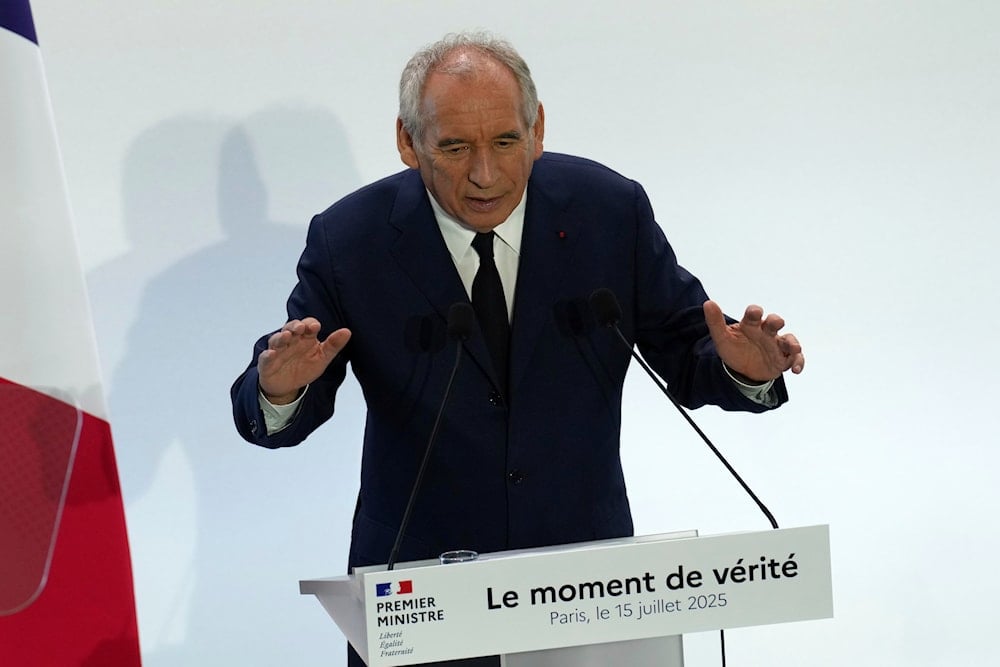Confidence vote threatens French government over austerity measures
French PM François Bayrou risks losing power as France heads for a September 8 confidence vote on €44 billion austerity cuts. With opposition parties united, the outcome could deepen the country’s political crisis.
-

French Prime Minister Francois Bayrou unveils plans for next year's budget, Tuesday, July 15, 2025 in Paris. (AP Photo/Aurelien Morissard)
France’s Prime Minister François Bayrou is preparing for a decisive confidence vote on September 8, a gamble that could topple his government and deepen the country’s ongoing political instability. The vote centers on his controversial austerity program, which aims to cut €44 billion annually to address France’s spiraling public finances.
Announcing the move on Monday, Bayrou said he would ask parliament to “confirm the scale” of budgetary reforms, warning that France’s future was at stake. “We face an immediate danger, which we must tackle…otherwise we have no future,” he declared, citing the country’s debt crisis.
“There are moments…when only a calculated risk can allow you to escape a more serious risk. It is a matter of the survival of our state, the image of our nation, and each and every family.”
France’s deficit reached 5.8% of GDP in 2024, nearly double the EU’s 3% limit, while its public debt rose to 114% of GDP, making it the third highest in Europe after Greece and Italy. Bayrou argues his plan is the only way to restore stability.
Opposition unites against the government
Early reactions suggest Bayrou’s survival is uncertain. The far-right National Rally's leader Jordan Bardella vowed his party would “never vote in favour of a government whose decisions are making the French suffer.” On the left, Manuel Bompard of Unbowed France (LFI) confirmed his deputies would vote to bring the government down.
The Greens and the Communist Party also pledged to oppose the austerity package, while Socialist Party leader Olivier Faure said Bayrou had “chosen to go” and confirmed his deputies would vote against the government.
Green Party head Marine Tondelier called the prime minister’s announcement “de facto a resignation,” reinforcing the sense that Bayrou’s government is already on borrowed time.
Political fallout and Macron’s options
If Bayrou loses, his administration, formed only in December 2024, would become the third government to collapse in the past year. His predecessor, Michel Barnier, resigned after just 90 days when a historic no-confidence vote in December 2024 brought down his cabinet.
Opposition leaders are already calling for the dissolution of parliament and fresh elections. Bardella declared, “Our fellow citizens are waiting for a change and a return to the ballot box: we are ready.”
However, President Emmanuel Macron, who dissolved parliament last year only to end up with a fractured assembly, is reluctant to risk another early election. Analysts suggest he may instead try to appoint another prime minister, though it remains unclear who could succeed where others have failed.
Economic troubles behind the vote
France’s fiscal situation is dire. Public spending accounted for 57% of GDP in 2024, while interest payments have become the government’s single largest budget expense.
Bayrou’s proposed cuts, the equivalent of €43.8 billion, include slashing state programs and freezing expenditures. Economists broadly agree that fiscal consolidation is necessary, but many warn that the timing and scale of the measures could backfire.
The Council of Economic Analysis has recommended that France pursue a gradual approach, aiming for a primary budget surplus in the medium term. Yet research by BNP Paribas cautions that Bayrou’s austerity package could “negatively affect French growth,” while the National Institute for Economic and Social Research highlights the risk of repeating past austerity-driven downturns.
The timing of the vote adds further pressure, as nationwide protests against austerity are already planned for September 10. The demonstrations, supported by trade unions and leftist parties, have drawn comparisons to the gilets jaunes movement that erupted in 2018.

 4 Min Read
4 Min Read










